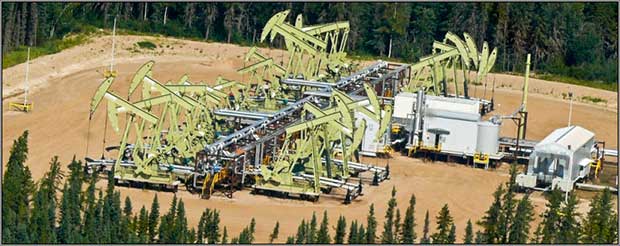WINNIPEG – Don’t throw resources under the bus. Energy represents Canada’s best economic and technological bet – by far. Once upon a time, Canadians prided themselves on extracting natural resources – farming, mining, logging, oil drilling and so on. Our workers were as skilled, courageous and productive as any in the world. Following World War Two, however, Central Canada’s expanding manufacturers began to see themselves as this country’s class acts, while hewing wood and drawing water were sniffily dismissed.
Maybe it’s time to take another look. A really hard look.
Ontario’s economic woes aren’t simply the result of cheaper labor in Mexico and Asia, though that factor is critical. Its high tech champions are being overwhelmed by larger foreign rivals like Apple, Samsung and Cisco. Meanwhile, the resources sector has clocked some big wins. In particular, Alberta’s hard-charging oil producers and service companies have revolutionized the international energy outlook through technological innovation.
Nortel, a Toronto-based telecom giant that was once Canada’s biggest company by many measures, is evaporating into the final stage of bankruptcy. Research in Motion, the Blackberry cellphone manufacturer, now finds itself reduced from international star to struggling desperately for simple survival. Even the Toronto Stock Exchange, pressed by technology changes in trading, has tried to hand over its future to London.
Despite Vancouver’s metropolitan size and ocean-side perch, the manufacturing picture looks far worse on the West Coast. For example, British Columbians once pinned big hopes on Ballard Power Systems, a fuel cell maker. Unfortunately, the 33-year-old firm has yet to deliver. Last year, it posted a net loss of $31.7 million on revenues of $75.4 million.
Seattle, Vancouver’s near-twin city just to the south, has generated Boeing, Microsoft and Starbucks. B.C. boasts few if any comparable achievements. Its largest forestry producer, MacMillan Bloedel, was acquired and absorbed by Weyerhaeuser, a Seattle-based rival (which happens to be the world’s largest in its sector). The province now lacks global-scale champions in manufacturing or forestry, its traditional economic mainstay.
Of course, Canadians should wish the best for Ballard and RIM, who may yet succeed. Given our serious setbacks in manufacturing, however, it makes absolutely no sense to throw the resources sector under the bus. Yet that’s exactly what green lobbyists are attempting to do, especially in British Columbia. And so far they’re succeeding.
Over the past generation, Western Canadian producers have brought on the oilsands, the world’s largest single source of crude. Its service companies have played pioneering roles in technologies like coiled tubing rigs and hydraulic fracturing of tight oil and gas reservoirs. As a direct result of those breakthroughs, the global outlook for these vital energy sources has improved dramatically.
Unfortunately, western producers have temporarily flooded their own markets thanks to those same achievements. Western crude, for instance, fetches $25 or so less per barrel than the global price. Not enough export pipeline capacity has been constructed to drain the rising output to key markets in the United States and Asia, depressing the price of all oil output in the West.
Canadians happen to be world-class when it comes to building and operating pipelines. So why aren’t we creating new pipeline capacity that is clearly needed?
Green lobbies have derailed the proposed Keystone XL pipeline expansion, at least temporarily, thus limiting access to the American market. In B.C., a coalition of green and aboriginal groups is tilting popular opinion against new pipeline capacity over the Rockies, cutting off the most practical route to Asian energy consumers.
Last December, the University of Calgary’s School of Public Policy released an in-depth report on this subject. “With better access and new pipeline capacity, oil producers will see more efficient access to international markets which can add up to $131 billion to Canada’s GDP between 2016 and 2030,” states the report, entitled Catching the Brass Rig: Oil Market Diversification Potential for Canada.
If that pipeline capacity remains unbuilt, the U of C study estimates that Canadians would lose more than $27 billion in federal, provincial and municipal tax receipts, along with an estimated 649,000 person-years of employment. Jobs would be forfeited from coast to coast in industries like steel, electronics and a host of other suppliers.
Most of the economic damage from inadequate pipeline capacity would occur in Alberta. Logically, Albertans should help all Canadians understand that we face a choice. Does Canada wish to be a country incapable of effectively developing either technology or resources? Or will this country transform itself into an energy superpower, valued by its customers and respected by all?
Mike Byfield
Vice President for Alberta Development
Frontier Policy Centre
The Frontier Centre for Public Policy
is an independent public policy think tank whose mission is “to broaden the debate on our future through public policy research and education and to explore positive changes within our public institutions that support economic growth and opportunity.”




